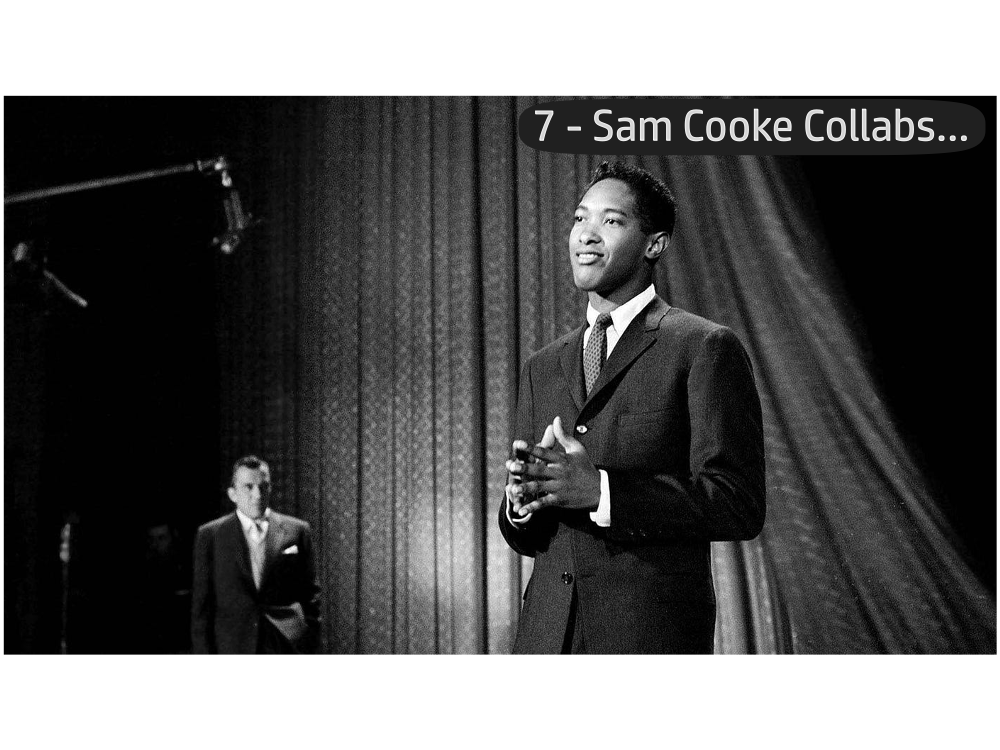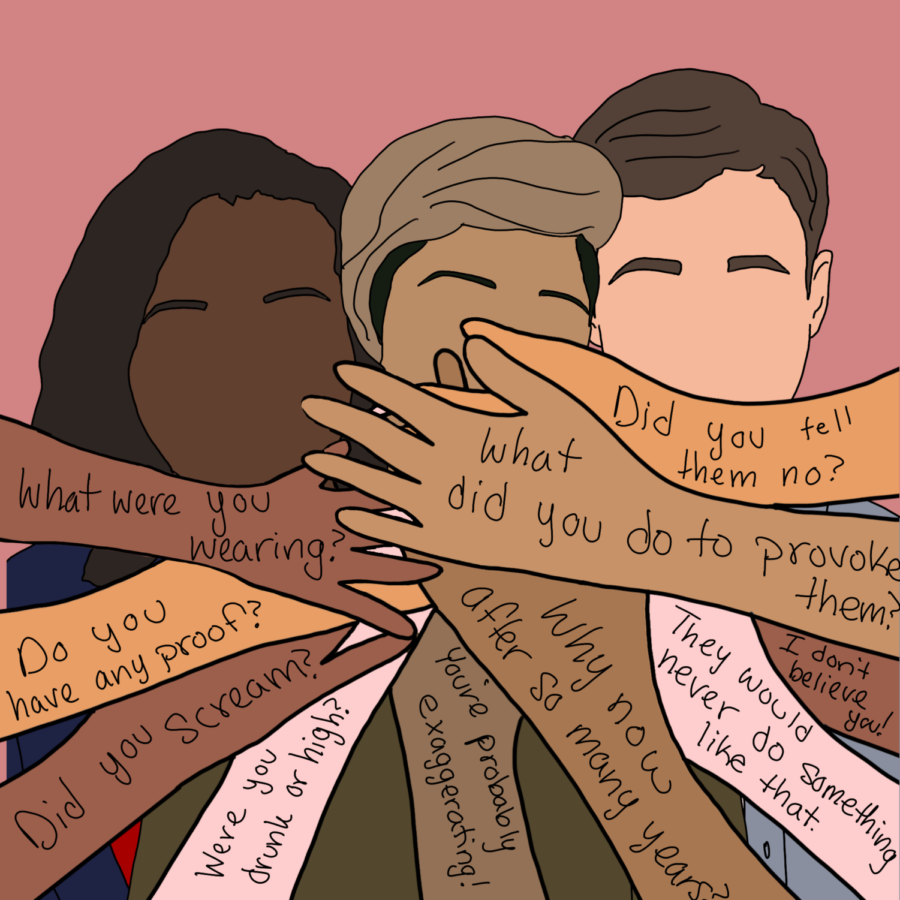(ThyBlackMan.com) When you think of Sam Cooke, you probably think of that satin-smooth voice gliding through classics like “A Change Is Gonna Come” or “Cupid.” But if you dig deeper — really listen beyond the big radio hits — you’ll find an artist who was never afraid to share the spotlight. For Sam, collaboration wasn’t just about singing pretty harmonies; it was about connection. About lifting up the people around him. About creating something that felt bigger than one man, one mic, or one audience.
These seven songs show Sam Cooke at his most generous, and sometimes his most raw. They’re moments when he leaned on his gospel family, trusted a young Bobby Womack to push him, or traded joyful shouts with a powerhouse like Dorothy Love Coates. They remind us that the roots of soul are tangled up in gospel call-and-response, late-night blues sessions, and the voices in the background that make the lead shine even brighter.
And the truth is, listening to these collabs now feels like finding a piece of musical history that’s somehow still alive — echoing in today’s gospel choirs, soul ballads, and the stripped-down, real performances we crave when life feels too polished and fake. If you’re like me, you know that feeling: when a song makes you want to close your eyes, nod your head, and say, “That’s it — that’s the real thing.” That’s what these songs do.
So pull up a chair, pour yourself something good, and spin these tracks like you’re in the back row of an old church or a smoky club where Sam and his friends are just warming up. Because once you hear him sing with these legends by his side, you’ll know: soul was never meant to be a solo act.

1) “That’s Where It’s At” (with Bobby Womack)
If there’s a single track that captures the warm mentor-protégé dynamic of Sam Cooke and Bobby Womack, it’s “That’s Where It’s At.” At the time, Womack was barely out of his teens, but his raw guitar lines and streetwise charm were already coming into their own under Cooke’s wing. Recorded in 1964, the song is drenched in that laid-back, late-night vibe — the kind of groove that sounds like it was made for the slow spin of a vinyl record on an old turntable.
What’s so striking about this track is how loose and unforced it feels. Cooke’s vocals float in and out of the pocket, warm and romantic but never showy. Womack’s guitar adds a sly, bluesy undercurrent that makes the whole thing feel alive — you can practically see the two of them trading ideas in the studio, pushing each other to find that sweet spot where soul, R&B, and a touch of gospel all melt together.
It’s easy to imagine the session: Cooke, the seasoned hitmaker, encouraging Womack to experiment, telling him not to worry about hitting every note perfectly but to find the feeling instead. There’s a kind of father-son energy there — a passing of the torch that’s subtle but profound. The song hums with that chemistry, that sense of two generations coming together to craft something timeless.
Listening to “That’s Where It’s At” today is a reminder of how timeless a good groove can be. There’s no bombastic production, no wall of sound — just two musicians in sync, creating a mood that could play at a backyard cookout in 2025 just as easily as it did in a club in 1964. For a generation raised on neo-soul and lo-fi R&B, this song still feels like a blueprint for keeping things warm, honest, and human.
More than anything, it’s a testament to Cooke’s role as a builder of bridges. He didn’t just sing about love; he created a legacy of it by lifting up young talent like Bobby Womack — a move that would ripple through soul music for decades to come. Today, Womack’s influence on artists like D’Angelo, Raphael Saadiq, and so many more all circles back to this moment: a guitar, a voice, a room full of possibility. That’s where it’s at.
2) “I Need You Now” (with The Soul Stirrers)
Before Sam Cooke became the face of crossover soul, he cut his teeth in the pews and church halls as the angelic tenor for The Soul Stirrers. “I Need You Now” is one of those recordings that shows why that foundation mattered so much. While not a duet in the pop sense, it’s very much a vocal collaboration — a layered, call-and-response dance between Cooke and his fellow singers.
Right from the first notes, you feel the tension and tenderness that made The Soul Stirrers special. Cooke’s lead soars with an urgency that pulls you in, but listen close and you’ll hear the other voices cradling him — each harmony a cushion for his voice to rise, fall, and plead with conviction. It’s a perfect marriage of lead and background, the collective sound making the plea even more powerful.
The beauty of “I Need You Now” is how it turns longing into a communal act. In so much of today’s music, longing can feel lonely — a single voice crying out. But here, every “I need you” is met with an echo, a promise that you’re never alone in your desire for connection. That’s something modern listeners still crave, even if they don’t realize it: the reassurance that our private aches are shared.
Today, “I Need You Now” still feels relevant in a world where gospel roots continue to seep into R&B and pop. You can hear its influence in artists who embrace rawness over polish — singers who know that sometimes a cracked note says more than a perfect one. It’s not about a slick hook or a radio edit; it’s about voices in unity, crying out for something bigger than themselves.
Play it when you need a reminder of where real soul comes from. Let those harmonies fold over you like a blanket. It’s a song that takes you back to wooden pews and tin-roof chapels but somehow still lands right in your heart, right now. No matter how much music technology evolves, you can’t fake the power of voices lifting each other up.
3) “Soothe Me” (with The Soul Stirrers)
Long before Sam Cooke made “Soothe Me” a secular standard, he road-tested its essence with The Soul Stirrers. In this version, the song is pure gospel lullaby — an offering of comfort and closeness that only a seasoned quartet could deliver.
What makes this collab so stunning is how subtle it is. There are no dramatic swells or showy solos. Instead, Cooke starts soft, his voice warm and reassuring, then the other singers weave in like a choir of gentle hands on your shoulders. It’s intimate, almost like overhearing a family prayer circle when they think no one is listening.
The layers are deceptively simple: a gentle hum, an echo here and there, a phrase repeated until it feels like a mantra. You can almost see the scene: a small room, four or five men leaning in, eyes closed, finding the note that feels like balm. There’s no rush — the magic is in the patience, the slow build that never fully explodes but seeps into you instead.
Listening to “Soothe Me” today, you realize why so much modern soul and R&B tries to capture this vibe. Artists like Leon Bridges, H.E.R., and even Anderson .Paak nod to this tradition — the idea that soul can be soothing, a balm for tired spirits. The way The Soul Stirrers interact here shows the power of true vocal collaboration: every line builds trust, every harmony deepens the sense of peace.
Put this song on when you’re feeling overwhelmed, when the world’s noise is too much. Let Sam Cooke and his brothers-in-harmony remind you that sometimes, the gentlest music can be the strongest shelter. It’s proof that when voices wrap around each other with care, they can turn even the simplest melody into a sanctuary.
4) “Win Your Love for Me” (with The Soul Stirrers influence)
“Win Your Love for Me” is one of those fascinating hybrids that shows how Cooke’s gospel past shaped his pop future. Though the recording is officially a solo hit, its DNA is soaked in the collaborative spirit of his time with The Soul Stirrers — especially when you catch those subtle background harmonies echoing the old call-and-response pattern.
The song is pure Sam: romantic, sincere, and impossibly catchy. But listen deeper, and you’ll hear the gospel phrasing he learned in church. Each word is stretched just enough to tug at your heart, and the layered echoes behind him feel like ghostly reminders of the quartet harmonies that made him famous. The tension between his sweet voice and the gentle echo of the group is what gives it depth.
It’s also a brilliant example of how Cooke could translate spiritual yearning into secular storytelling. He takes the same vocal tools he once used to reach out to the divine and flips them into a promise to a lover — a plea for a different kind of salvation. That tension is what made him so groundbreaking: the idea that romantic love and spiritual longing come from the same place.
“Win Your Love for Me” still works today because it sounds so effortless. There’s no wall of instruments fighting for attention — just that sweet melody, Sam’s hopeful plea, and the gentle cushion of voices behind him. It’s a reminder that sometimes, collaboration isn’t about two superstars battling for the spotlight — it’s about how a singer carries his roots with him wherever he goes.
Next time you’re building a throwback playlist for a date night, slip this in. Its innocence and warmth are timeless. It’s a little love letter to the way gospel and pop can meet halfway and make something beautiful. It’s also a reminder that behind every solo star is a chorus of voices, a family of harmonies, and a spiritual DNA that never really fades.
5) “Feel It” (with The Soul Stirrers)
“Feel It” might be one of the most underrated showcases of what made The Soul Stirrers and Sam Cooke so electrifying together. This live recording is raw and a bit rough around the edges — and that’s exactly what makes it feel alive. You can practically hear the creak of the church pews and the scuffle of shoes on the wooden floor. There’s an atmosphere here that no studio trickery can fake.
From the first note, you hear the back-and-forth that defined the group’s power: Cooke’s bright, agile lead calls out, and the other voices push him to dig deeper. There’s a sense of competition, but it’s playful — the kind of musical banter that only happens when singers know each other inside and out. It’s more than harmonies; it’s a test of faith and fire, each singer daring the other to step further into the spirit.
One of the striking things about “Feel It” is how much breath you can hear in it. When Cooke wails, you can almost feel the air catch in his throat. The background singers hit their notes with that old-school church-house grit — a touch of rasp, a hint of strain — reminding you that gospel was never meant to be pretty alone; it was meant to move you. And it still does.
Today, “Feel It” is a refreshing listen if you’re tired of overproduced tracks. The imperfections — a note that slides off key for half a beat, the audible shouts in the background — are what make it human. Modern artists who lean into live performance — think Anderson .Paak’s Tiny Desk vibe or the raw edges of early Leon Bridges — owe a debt to songs like this. It’s music that trusts its audience to feel the spirit, not just hear it.
When you play “Feel It,” you’re reminded that soul is as much about the moment as it is about the melody. It’s a collaboration between voices, yes — but also between the singers and the audience. It makes you want to clap your hands, stomp your feet, and let go of perfection. In a world obsessed with flawless takes and auto-tune, “Feel It” stands tall as a testament to the messy, beautiful power of singing your heart out and letting the chips fall where they may.
6) “Little Red Rooster” (with Billy Preston & Clifton White)
This might be the most unexpected gem on this list. “Little Red Rooster” finds Sam Cooke sliding into the blues with a young Billy Preston on keys and Clifton White on guitar — two players who knew how to bring the juke-joint energy to Cooke’s usually polished delivery. It’s an inspired moment when Cooke lets the grit in his voice shine, stepping away from his smooth crooner persona to roll around in the dirt of Delta blues.
This track is all about the vibe. Preston’s organ playing adds a swampy undercurrent that pushes Cooke to loosen up, while White’s guitar licks cut through the groove like a warm blade. Together, they build a sound that feels like a late-night jam session — the kind that happens when the lights are low, the crowd is half gone, and the band is playing for themselves as much as for anyone listening.
Cooke’s voice dips lower than usual here, slipping into a sly, slightly mischievous drawl that shows he could hang with the blues shouters just as easily as the crooners. You can almost hear him smiling as he leans into the verses, teasing out the words with the knowing wink of a man who’s seen a few roosters — and maybe even been one himself.
In a modern context, “Little Red Rooster” feels like a missing link between traditional soul and the grittier sides of rhythm & blues. It’s easy to picture it being sampled by a modern blues-rock band or flipped into a smoky interlude on a rap album. There’s something raw and timeless here — a reminder that soul music didn’t come out of nowhere; it was forged in the same fires as the blues.
Play this one when you want a different side of Sam — the bluesman, the band leader, the guy who could trade licks and laughs with his players instead of standing alone at the mic. It’s a reminder that collaboration isn’t always polished; sometimes, it’s about getting down and dirty with the groove. And when you do, you find gold in the grit.
7) “Good News” (with Dorothy Love Coates & The Gospel Harmonettes — live)
Closing out this list is a true treasure: “Good News,” performed live with the unstoppable Dorothy Love Coates and The Gospel Harmonettes. This collab is less famous than some of Cooke’s other work, but it’s a vivid snapshot of how he thrived when surrounded by powerhouse female voices — voices that could match his spirit note for note and raise him higher.
“Good News” is pure jubilation. It’s a call-and-response masterpiece, with Coates’ fiery shouts bouncing off Cooke’s silky runs. You can hear their shared roots in every line — the revival meetings, the foot-stomping tent shows, the endless Sunday mornings that shaped them both. There’s an almost competitive edge here too — you can hear each trying to outdo the other in praise and fervor, which only makes the whole thing soar higher. The Gospel Harmonettes wrap it all in tight, joyful harmonies that lift the entire church.
One of the thrills of this performance is how unrestrained it feels. Coates was a dynamo, known for shaking the pews with her thunderous delivery, and you can hear Cooke rise to meet her energy — adding flourishes to his phrases, holding a note just a beat longer to let her answer back. It’s the sound of two greats trusting each other enough to push each other to the edge.
Today, “Good News” hits hard because it’s unfiltered spiritual energy. There’s no studio polish, no overdubs — just singers pushing each other to the edge of their range, feeding off the congregation’s shouts and stomps. For fans of modern gospel choirs like Kirk Franklin’s crew or Maverick City Music, this is the blueprint: pure, participatory praise that blurs the line between the stage and the pews.
Play this when you want to feel the roots of soul music shaking the floor under you. It’s the sound of community, trust, and a fearless exchange between male and female gospel powerhouses. “Good News” proves that Sam Cooke didn’t just cross musical boundaries — he broke them wide open. And in that glorious collision of voices, you hear the promise that soul music will always find new ways to shout its truth.
If there’s one thing these seven songs remind me of, it’s that music at its best feels like family. It’s imperfect, unpredictable, and always richer when more voices are in the room. Sam Cooke was more than the King of Soul — he was a bridge between gospel’s raw joy and soul’s sweet ache, a mentor, a bandmate, and a brother to anyone who could carry a tune with heart.
Today, artists still chase that magic: that feeling of voices blending together, of a groove that can’t be replicated by a machine, of a note so honest it gives you chills. We see it in basement jam sessions, at open mic nights, in church choirs that shake the rafters every Sunday. Every time you hear a singer lean into a run or a choir answer back, you’re hearing the echo of Sam and his collaborators doing what they did best — telling the truth in a way only music can.
So don’t just let these tracks play in the background. Let them remind you that real soul is never just about the voice in the front — it’s about the people behind it too. The ones clapping, harmonizing, shouting “Amen,” and pushing that voice higher. Because when Sam Cooke sang with others, he wasn’t just performing; he was inviting us all to feel it too.
Keep these songs close, pass them on, and whenever life gets too quiet, put them on and let Sam Cooke and his friends remind you: the best news is still good news when it’s sung from the heart.
Staff Writer; Jamar Jackson

















Leave a Reply